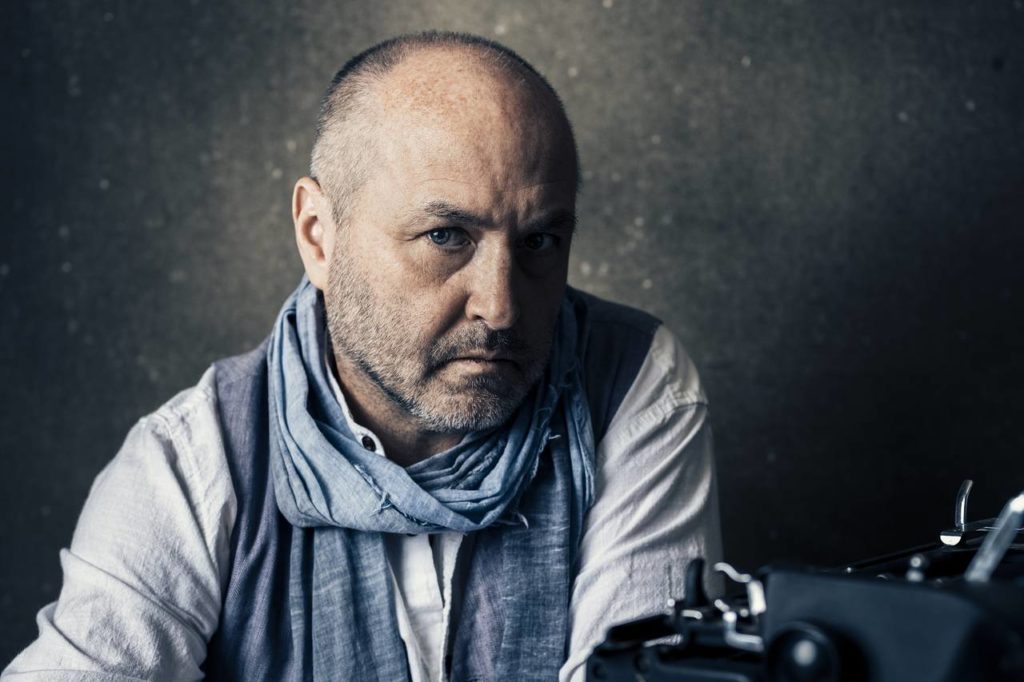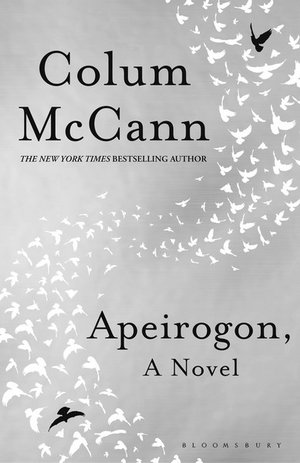Australia/Israel Review
Biblio File: A Novel Approach
Dec 24, 2020 | Allon Lee

 Apeirogon
Apeirogon
Colum McCann, Bloomsbury, 2020. 224 pp. $29.95
Apeirogon (pronounced “a paragon”) is a new novel from Irish author Colum McCann that delves into the Israeli-Palestinian conflict.
The title refers to an object with an infinite number of sides and complexity.
While Apeirogon was longlisted for this year’s Booker Prize, the eventual winner was Shuggie Bain, by first-time novelist Douglas Stuart, and based on his own lived experience of poverty in Glasgow, Scotland.
By contrast, McCann’s novel has nothing to do with his own story.
Rather, it is the fictionalised account of two other real people – Rami Elhanan, an Israeli, and Bassam Aramin, a Palestinian.
Both men belong to an organisation called Combatants for Peace which is dedicated to promoting dialogue between Israelis and Palestinians by “speak[ing] out: against the Occupation, humiliation, murder, torture.”
Both men have experienced the unfathomable loss of their daughters.
Rami’s daughter, Smadar, 14, was murdered in a suicide bombing in 1997.
Aramin lost his ten-year-old daughter Abir in 2007 – when he was already a member of Combatants for Peace. A stray rubber bullet fired by an Israeli soldier during clashes in the Palestinian town Anata in the West Bank hit Abir in the back of the head.
Aramin had an epiphany when he learnt about the Holocaust whilst in jail for carrying out a terror attack.
The percentage of the book that is actually factually true is unclear. A rider at the start says, “Bassam and Rami have allowed me to shape and reshape their words and worlds.”
An afterword says, “This is… a work of storytelling which, like all storytelling, weaves together elements of speculation, memory, fact, and imagination.”
McCann deals with the complexity and the trauma of the two fathers by keeping the reader off-balance.
The narrative is not chronological. Time is elastic. Many of the chapters contain only a few sentences and many seemingly bear no connection to the main story.
Despite the confusion, Apeirogon’s message is not obscure – Israel’s occupation must end and the ongoing conflict is not inevitable but a choice.
McCann’s prescription is simple, courtesy of a bumper sticker that says, “It will not be over until we talk.”
Talking is the essence of recognising each other’s humanity. Yet some pro-Palestinian reviews have insisted there has been too much talking.
But at base, McCann is onto something.
Over the past 20 years, the Palestinian Authority has spent only a handful of months in direct peace talks with Israel. Hamas, none at all.
Despite this appeal to the two nations’ better angels, the book’s overriding theme seems to be ‘here are the Palestinians who are victims of Israelis and here are Israelis who agree that the Palestinians are their victims.’
McCann is eager to show Jews, Arabs, Christians and Muslims how they share a common cultural patrimony, writing in one chapter:
“[Eliezer] Ben-Yehuda, like Einstein, said that Jews and Arabs were mishpacha, a family, that they should share the land and live together. Many of the new Hebrew words that he helped coin were derived from Arabic roots. The two were, he said, sister languages which, like the people, could live with and alongside one another….The bombs went off near the conjunction of Ben Yehuda and Ben Hilel Streets, also known as Hillel Street, named after Hillel the Elder, author, in the first century before Christ, of the ethic of reciprocity: That which is hateful to you, do not do to your fellow.”
Yet questions of authenticity ripple throughout the text.
The provenance of the ancestors of the Israeli protagonists is noted. Most of them are from European nations.
The Palestinians, meanwhile, are repeatedly depicted as rooted in the land. Indeed, Aramin says he was born in a cave.
Elsewhere McCann writes:
“The Israeli hospital. At Ein Kerem. An ancient Palestinian village, once… Where Smadar was born.”
Archaeology shows Ein Kerem was a Jewish village during the time of the 1st and 2nd Temple – long predating the term “Palestinian”. But that is not noted.
It is hard not to feel that McCann has missed a trick.
Decades before Zionism got its act together, resistance, violence and antisemitism were directed at the trickle of Jews who arrived in the Holy Land.
In 1881, the Sultan ordered that Jews could settle anywhere in the Ottoman Empire bar the Land of Israel. Maybe this was too trivial.
In his effort to inject some humility into the sides, the book is a veritable cornucopia of trivia seemingly unrelated to the Israeli-Palestinian conflict but apparently intended to show how everything is interconnected.
Sometimes it is interesting, other times it is just trite, such as the chapter which states that:
“The M-16 used to shoot Abir was manufactured near the town of Samaria, North Carolina…Samaria also being home of the ancient capital of the Kingdom of Israel.”
Many chapters have an ornithological focus, hinting that borders are artificial, and birds who enjoy more freedom than Palestinians show there is a world that exists beyond humanity’s petty squabbles.
Extending the bird metaphor, McCann writes of the moment when Bassam’s daughter Abir is hit by a rubber bullet “crushing the bones in her skull like those of a tiny ortolan.”
The ortolan is a tiny endangered bird that is prepared by French chefs for a decadent and illegal meal, consumed in one gulp. Custom dictates the meal be eaten under a napkin to hide the shamefulness of the act.
Other recurrent and problematic themes include references to Christian martyrdom and intimations that Israel is exploiting the Holocaust to justify its actions.
Also contentious is the false equivalence made between the deaths of the girls Smadar and Abir.
Is the one murdered in a deliberately planned suicide bombing attack in Jerusalem’s busy Ben Yehuda Street really the same as the other who was in the wrong place, at the wrong time and died after being shot by a rubber bullet that, in most instances and by design, will not kill?
Was the Israeli family, who are hardly typical, the best choice to focus on?
Of Smadar’s mother, Nurit, McCann writes:
“The killing was not the fault of the bombers, she said. The bombers were victims too. Israel was culpable. The blood was on its hands. On Netanyahu’s hands. On her own hands too, she said. She was not immune, everyone was complicit. Oppression. Tyranny. Megalomania. She was shown on national TV. Pundits said she was just in shock. It wasn’t shock at all, she replied. The only shock was that the Palestinian bombings didn’t happen more often. “Israel was inviting its own children to be slaughtered, she said. They might as well put Semtex in their schoolbags. It would never be at peace until it recognized this.”
That would be Nurit Peled-Elhanan, whose father, Matti Peled, was once an Israeli general but became one of its most radical peaceniks.
Her brother, Miko Peled, is a well-known US-based anti-Israel activist who supports the Boycott, Divestment and Sanctions movement against Israel.
McCann writes of Israelis accusing Matti Peled of being a traitor for meeting with PLO chairman Yasser Arafat, but also of his trenchant criticism of the Oslo Accords – damned by him in 1994 before they were even given a chance.
The Elhanan/Peled family are, of course, entitled to their own political opinions.
But do other less radical Israelis not crave an equitable solution?
Also contentious is McCann’s decision to ignore Israeli PM Ehud Barak’s offers in 2000/01 to create a Palestinian state, which, if Arafat had accepted instead of initiating the terror of the Second Intifada, might have averted Abir’s death in 2007.
Yet, unlike Arafat’s exhortation in 1974 to the UN – “Do not let the olive branch fall from my hand” – which appears in the book five times, Barak doesn’t rate a mention even once.
And what of other consequential Israeli leaders?
Smadar is depicted disparaging Shimon Peres – the real father of Oslo, the historic breakthrough that led to both sides talking openly for the first time.
Some pro-Palestinian critics have objected to the book’s title on the grounds that it implies there are two sides and the issue is complex – which they insist is not true.
There is nothing new in this view of the Jewish presence in Israel.
Amos Oz’s pithy observation that the conflict “is a clash between right and right” has never enjoyed much traction on the Palestinian side.
Given the book is a catalogue of damning allegations against Israel, it is hard to understand their objections.
At a more basic level, it is an undeniable truth that Israeli offers to “talk” to end the occupation have been rejected over and over again.
Until that attitude changes, maybe, for now, there is nothing to talk about.
Tags: Israel, Media/ Academia, Palestinians






